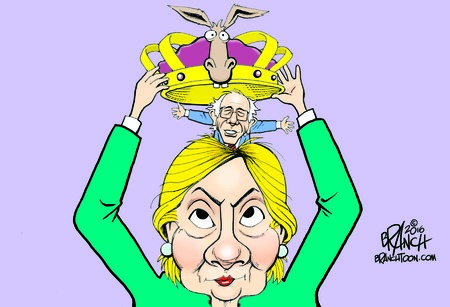
The reclusive yet ruthless Howard Hughes once remarked: “Every man has his price, or a guy like me couldn’t exist."
As far as presidential politics is concerned, Hughes was dead right. Be it paying off campaign debt or the shiny lure of a new job in Washington, most also-rans can be easily bought (see “Christie, Chris").
Unfortunately for Hillary Clinton, the same rules seemingly don’t apply to Bernie Sanders. Sure, Sanders is destined to come up short in his long-shot quest to best Clinton for the Democratic nomination. Mrs. Clinton is within 100 delegates of clinching a first-ballot win. Even if the Democrats changed the rules, Bernie still would be trailing.
One area where there could be grounds for a Clinton-Sanders truce and coming-together: money. She’s good at raking it in; he’s good at “berning" through it at an alarming rate – about $40 million a month, which doesn’t bode well for a campaign that began May with about $6 million in cash on hand.
Otherwise, here are are four possible negotiating topics if and when two candidates decide it’s time to strike a deal.
Debbie Wasserman Schultz. In case there’s any doubt as to how much disdain Sanders has for the Democratic National Committee chair and Florida congresswoman: over the weekend, he endorsed her primary rival.
Why the hard feelings? It was Wasserman Schultz who made sure that her party retained a healthy chunk of super delegates (15% of all delegates in 2016) when the DNC last considered whether to scrap the category.
And it was Wasserman Schultz who did the Clinton campaign a “yuge" favor by ensuring that some of the frontrunner’s debates with Sanders were relegated to low-ratings Sundays.
The easy bargain: Clinton assures Sanders that Wasserman Schultz is out of her DNC job once the election over – and the President-elect wants him to help her choose the replacement.
The Platform. For all the talk about an unruly Democratic National Convention along the lines of Chicago in 1968, what Sanders would much prefer is the 1972 experience: a party platform reflecting the sentiments of an angry left.
What sort of ideas would Sanders want to see incorporated into his party’s 2016 blueprint? Try: economic class warfare (the idea that the system rewards the wealthiest and punishes the poorest), breaking up Wall Street banks, a ban of hydraulic fracking, plus a more “even-handed" approach to Israel-Palestine tensions.
A fun exercise: go through the top 10-or-so ideas on Sanders’ website and see how many actually make it to a vote in Philadelphia.
The Cabinet. Call it the Abraham Lincoln approach (“team of rivals"), the Barack Obama precedent (Secretary of State Clinton), or Michael Corleone realpolitik (“keep your friends close, your enemies closer").
Forget the big prize: Treasury Secretary. What about a made-up position such as “Inequality Czar"? The problem with such a hire: it gives Sanders too many occasions to give speeches not necessarily in line with the new Administration; pity the poor White House Chief of Staff who has to constantly relay, to the Czar, that Madame President is not amused.
Here’s one suggestion, if Mrs. Clinton really wants to go down this route (personally, I think she’d be foolish to do so): appoint Sanders chairman of the Securities and Exchange.
Ok, now that you’ve stopped laughing . . .
Assuming the Senate’s under Democratic management in 2017, it keeps Sanders from being a thorn in Clinton’s side on the legislative side. And, as FDR discovered when he tasked Joseph P. Kennedy with the job back when the commission was created 80-plus years ago, it’s one way to keep a political rival in check.
Unless Sanders is fixated on something grander, which would be . . .
The Ticket. Clinton hasn’t ruled out Sanders as a running mate (funny thing is: Donald Trump seems warmer to the idea – and warmer still to the idea of Bernie starting an independent campaign).
In theory, putting Sanders on the Democratic ticket is an easiest way to placate his supporters. Then again, Massachusetts Sen. Elizabeth Warren would serve that purpose.
As might Hawaii Rep. Tulsi Gabbard, a Sanders supporter and Wasserman Shultz critic.
Gabbard, in fact, offers two things that Warren does not: military credentials (two tours of duty in the Middle East with her state’s Army National Guard) and generational appeal (Gabbard turned 35 in April; Warren is only two years younger than the 68-year-old Clinton.)
And to save you the trouble of looking it up: John C. Breckenridge, at the age of 36 years and 47 days, holds the record for America’s youngest vice president.
That may sound far-fetched. Then again, so does the notion that, but a year ago, no one envisioned Hillary Clinton ever needing to pay attention to — much less having to make peace with — Bernie Sanders at this point in the Democratic contest.
Comment by clicking here.
Bill Whalen is a research fellow at the Hoover Institution, where he studies and writes on current events and political trends. In citing Whalen as one of its "top-ten" political reporters, The 1992 Media Guide said of his work: "The New York Times could trade six of its political writers for Whalen and still get a bargain." During those years, Whalen also appeared frequently on C-SPAN, National Public Radio, and CNBC.


 Contact The Editor
Contact The Editor
 Articles By This Author
Articles By This Author
